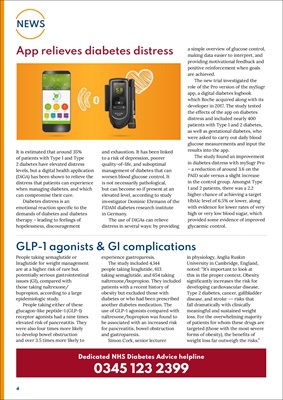
4
NEWS
Dedicated NHS Diabetes Advice helpline
0345 123 2399
App relieves diabetes distress
It is estimated that around 35%
of patients with Type 1 and Type
2 diabetes have elevated distress
levels, but a digital health application
(DiGA) has been shown to relieve the
distress that patients can experience
when managing diabetes, and which
can compromise their care.
Diabetes distress is an
emotional reaction specific to the
demands of diabetes and diabetes
therapy - leading to feelings of
hopelessness, discouragement
and exhaustion. It has been linked
to a risk of depression, poorer
quality-of-life, and suboptimal
management of diabetes that can
worsen blood glucose control. It
is not necessarily pathological,
but can become so if present at an
elevated level, according to study
investigator Dominic Ehrmann of the
FIDAM diabetes research institute
in Germany.
The use of DiGAs can relieve
distress in several ways: by providing
a simple overview of glucose control,
making data easier to interpret, and
providing motivational feedback and
positive reinforcement when goals
are achieved.
The new trial investigated the
role of the Pro version of the mySugr
app, a digital diabetes logbook
which Roche acquired along with its
developer in 2017. The study tested
the effects of the app on diabetes
distress and included nearly 400
patients with Type 1 and 2 diabetes,
as well as gestational diabetes, who
were asked to carry out daily blood
glucose measurements and input the
results into the app.
The study found an improvement
in diabetes distress with mySugr Pro
- a reduction of around 3.6 on the
PAID scale versus a slight increase
in the control group. Amongst Type
1 and 2 patients, there was a 2.2
higher chance of achieving a target
HbA1c level of 6.5% or lower, along
with evidence for lower rates of very
high or very low blood sugar, which
provided some evidence of improved
glycaemic control.
GLP-1 agonists & GI complications
People taking semaglutide or
liraglutide for weight management
are at a higher risk of rare but
potentially serious gastrointestinal
issues (GI), compared with
those taking naltrexone/
bupropion, according to a large
epidemiologic study.
People taking either of these
glucagon-like peptide-1 (GLP-1)
receptor agonists had a nine times
elevated risk of pancreatitis. They
were also four times more likely
to develop bowel obstruction
and over 3.5 times more likely to
experience gastroparesis.
The study included 4,144
people taking liraglutide, 613
taking semaglutide, and 654 taking
naltrexone/bupropion. They included
patients with a recent history of
obesity but excluded those with
diabetes or who had been prescribed
another diabetes medication. The
use of GLP-1 agonists compared with
naltrexone/bupropion was found to
be associated with an increased risk
for pancreatitis, bowel obstruction
and gastroparesis.
Simon Cork, senior lecturer
in physiology, Anglia Ruskin
University in Cambridge, England,
noted: "It's important to look at
this in the proper context. Obesity
significantly increases the risk for
developing cardiovascular disease,
Type 2 diabetes, cancer, gallbladder
disease, and stroke ¬- risks that
fall dramatically with clinically
meaningful and sustained weight
loss. For the overwhelming majority
of patients for whom these drugs are
targeted (those with the most severe
forms of obesity), the benefits of
weight loss far outweigh the risks."